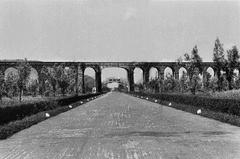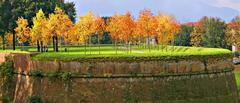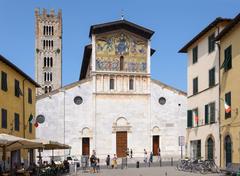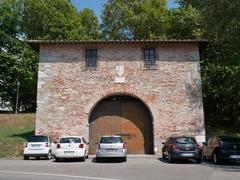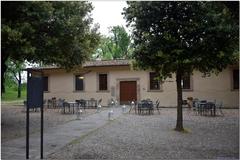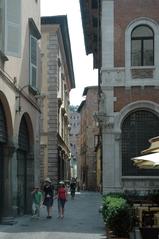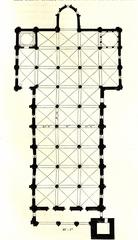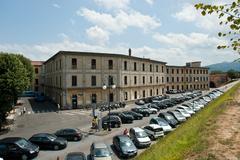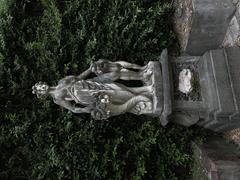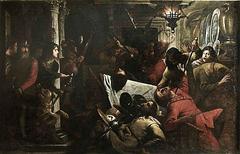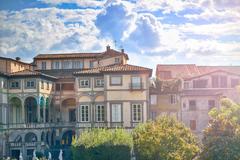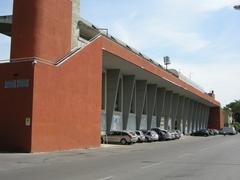Baluardo Santa Croce Visiting Hours, Tickets, and Lucca Historical Sites Guide
Date: 14/06/2025
Introduction
Baluardo Santa Croce is a remarkable testament to Lucca’s layered history, blending centuries of military architecture with modern cultural significance. Located on Lucca’s iconic Renaissance walls, this bastion symbolizes the city’s enduring resilience and civic pride. Originally built around a medieval tower and expanded in the 16th century to counter advances in artillery, Baluardo Santa Croce features distinctive white limestone foundations and Renaissance-era brickwork, marking the evolution of defensive strategies from the Roman era through the Renaissance (EatWalkLucca; Turismo Lucca).
Following a significant restoration completed in 2025, Baluardo Santa Croce now welcomes visitors with a permanent exhibition, “Ri-conoscere le Mura,” hosted in its atmospheric underground galleries. This interactive experience combines archival documentation and multimedia presentations to illuminate the bastion’s architectural and historical significance (Comune di Lucca). The site’s panoramic promenade, shaded by field maples, offers breathtaking views of Lucca and the Tuscan landscape.
This guide compiles all essential information for a seamless visit: hours, tickets, accessibility, travel tips, and integration with Lucca’s broader historical circuit (Lucca Historiae Fest; Two Parts Italy).
Contents
- Introduction
- Historical Overview
- Roman & Medieval Foundations
- Renaissance Transformation
- Integration within Lucca’s Walls
- Symbolism & Preservation
- Architectural & Natural Features
- Visiting Information
- Hours
- Tickets
- Accessibility
- Travel Tips
- Exhibition & Restoration
- Cultural Significance
- Guided Tours & Visitor Services
- Integration with Other Lucca Sites
- Events & Programming
- Practical Tips
- FAQ
- Visuals & Media
- Conclusion
- Sources
Historical Overview
Roman & Medieval Foundations
Lucca’s origins are rooted in the Roman era, with the city’s name likely derived from the term “Luk,” meaning “marsh,” alluding to its early topography (EatWalkLucca). The organized Roman street grid and original city walls established Lucca as a strategic and defensible location. During the early medieval period, these fortifications were reinforced to protect against Lombard and Frankish invasions, setting the stage for the later emergence of the Baluardo Santa Croce.
Renaissance Transformation
Lucca’s prosperity in the medieval period, fueled by its silk trade, enabled the city to maintain autonomy even as neighboring regions fell to the Medici. The Baluardo Santa Croce, constructed in the Renaissance, replaced earlier fortifications, enveloping a 15th-century tower with robust walls designed to repel cannon fire (Turismo Lucca). The juxtaposition of limestone and brickwork represents this evolution in military engineering.
Integration within Lucca’s Walls
The current ring of Lucca’s walls, including Baluardo Santa Croce, was completed over a century starting in the early 1500s. The 4.2 km circuit, dotted with eleven bastions, remains among Europe’s best-preserved Renaissance fortifications (EatWalkLucca). The design of Santa Croce, with its concentric layering and maple-planted promenade, reflects the city’s adaptive use of military sites for communal life.
Symbolism & Preservation
Baluardo Santa Croce stands as a symbol of Lucca’s resilience and independence. Its name references the city’s religious heritage, notably the revered Volto Santo relic. The bastion’s layered architecture embodies the city’s pragmatic adaptation to changing times. In modern history, the site has transitioned from military bastion to beloved public park, surviving wars and urban development with its structure and spirit intact (Turismo Lucca).
Architectural & Natural Features
The bastion’s most striking features are its visible layers of white limestone and Renaissance brickwork, physically narrating centuries of construction (Turismo Lucca). Field maples planted atop the bastion not only stabilize the earthworks but also create a unique green belt around Lucca’s historic center—a hallmark of the city’s walls.
Key architectural highlights include:
- Double-tiered casemates for artillery
- Soldiers’ barracks overlooking the city
- Extensive underground galleries for munitions and defensive movements (Two Parts Italy)
Visiting Information
Hours
- Promenade: Daily, sunrise to sunset
- Underground Exhibition: Tuesday–Sunday, 10:00 AM – 4:30 PM; closed Mondays and public holidays (Turismo Lucca)
Tickets
- General Access: Free
- Exhibitions & Guided Tours: Free, but special events or tours may require booking or a nominal fee
Accessibility
- Promenade: Wheelchair and stroller accessible via paved paths
- Underground galleries: Some areas have stairs and uneven surfaces; inquire in advance for accommodations
Travel Tips
- Visit in spring or autumn for mild weather and lighter crowds
- Comfortable shoes recommended
- Combine your visit with nearby sites such as the Cathedral of San Martino or botanical gardens
Exhibition & Restoration
The recent restoration introduced the “Ri-conoscere le Mura” exhibition, transforming the underground galleries into an immersive educational journey. Visitors follow a curated path through bilingual panels, interactive projections, and displays of archival records, tracing the history and protocols of Lucca’s defense (Comune di Lucca). The exhibition supports Lucca’s vision of its walls as a living “deposito di cultura.”
Cultural Significance
Religious Heritage
The bastion’s name and location tie it to Lucca’s veneration of the Volto Santo, a relic enshrined in the Cathedral of San Martino. The annual Festa di Santa Croce, including the Luminara candlelit procession, highlights the bastion’s role in local spiritual and civic life (Visit Tuscany).
Festivals & Community Events
Baluardo Santa Croce is central to Lucca Historiae Fest and other festivals celebrating the city’s layered past, with historical reenactments and interactive exhibits (Lucca Historiae Fest). It also hosts contemporary art shows, music events, and community gatherings, reinforcing its place in the city’s daily life (Lucca in Diretta; Two Parts Italy).
Guided Tours & Visitor Services
- Guided Tours: Available via the Infopoint Walls of Lucca (Porta San Donato), or book online (Turismo Lucca)
- Amenities: Restrooms and seating on-site; no café or gift shop, but souvenirs are available at the Infopoint
- Contact: Tel. +39 0583 583150, [email protected]
Integration with Other Lucca Sites
Baluardo Santa Croce is a highlight among Lucca’s bastions, conveniently located for walking or cycling tours that include the city walls, other bastions, city gates, and landmarks like Piazza San Michele. Interactive Info Points at Porta San Donato provide maps, displays, and multilingual staff for further exploration (Comune di Lucca).
Events & Programming
- Lucca Historiae Fest: Historical reenactments and interactive learning (Lucca Historiae Fest)
- Art and Music Festivals: Open-air concerts, art installations, and seasonal events
- Workshops & Family Activities: Especially during festivals and school programs
Practical Tips
- Best Time: Early morning or late afternoon for tranquility and ideal lighting
- Weather: Galleries stay cool; parade ground is exposed—bring sun protection or a jacket as needed
- Safety: Respect restricted areas; pets welcome outdoors, but may be restricted in galleries
Frequently Asked Questions (FAQ)
Q: What are the visiting hours of Baluardo Santa Croce?
A: Outdoor promenade: sunrise to sunset. Underground exhibition: Tuesday–Sunday, 10:00 AM–4:30 PM.
Q: Is there an entrance fee or tickets required?
A: No; general access is free. Special tours or events may require booking.
Q: Are guided tours available?
A: Yes, bookable at the Infopoint or online.
Q: Is Baluardo Santa Croce accessible for people with disabilities?
A: Promenade is fully accessible; some underground areas have stairs.
Q: Are there restrooms or food facilities?
A: Restrooms and seating are available; no on-site café.
Visuals & Media Suggestions
For a richer experience, consult the official tourism website’s galleries and virtual tours. Use photos with descriptive alt tags such as “Baluardo Santa Croce visiting hours” or “Lucca historical sites panorama” to preview your visit (Turismo Lucca).
Conclusion
Baluardo Santa Croce is a living monument where Lucca’s military, civic, and cultural histories intersect. Free to access, with immersive exhibitions and a scenic promenade, the bastion offers a compelling journey through centuries of innovation, resilience, and community spirit. To maximize your experience, check current schedules, consider a guided tour, and explore the surrounding walls and attractions.
Enhance your visit with the Audiala app for audio tours and events, and follow Lucca’s official channels for updates. Embrace this opportunity to witness where history, architecture, and Tuscan beauty converge.
Sources
- EatWalkLucca. (https://www.eatwalklucca.com/lucca-and-its-famous-walls/)
- Turismo Lucca. (https://www.turismo.lucca.it/index.php/gli-alberi-delle-mura)
- Catalogo Beni Culturali. (https://www.catalogo.beniculturali.it/detail/ArchitecturalOrLandscapeHeritage/0900511547-17)
- Two Parts Italy. (https://www.twopartsitaly.com/blog/2017/11/24/underneath-the-walls-of-lucca)
- Visit Tuscany. (https://www.visittuscany.com/en/events/the-festa-di-santa-croce-in-lucca/)
- Lucca Historiae Fest. (https://luccahistoriaefest.it/orologio-del-tempo/)
- Lucca in Diretta. (https://www.luccaindiretta.it/dalla-citta/2025/02/27/ri-conoscere-le-mura-riapre-il-percorso-espositivo-nel-sotterraneo-del-baluardo-santa-croce/448700/)
- Altopascio.info. (https://altopascio.info/2025/02/18/a-lucca-questanno-agt-lucca-ha-scelto-di-festeggiare-la-riapertura-del-baluardo-santa-croce/)
- Comune di Lucca. (https://www.comune.lucca.it/notizia/ri-conoscere-le-mura-una-mostra-permanente-per-la-valorizzazione-delle-sortite-e-dei-sotterranei-del-piu-importante-monumento-cittadino/)
- Florence Tips. (https://florencetips.com/lucca.html)
- Lucca WhatsOn. (https://www.luccawhatson.com/calendar)
- Turismo Lucca. (https://turismo.lucca.it/en/ri-conoscere-le-mura)
